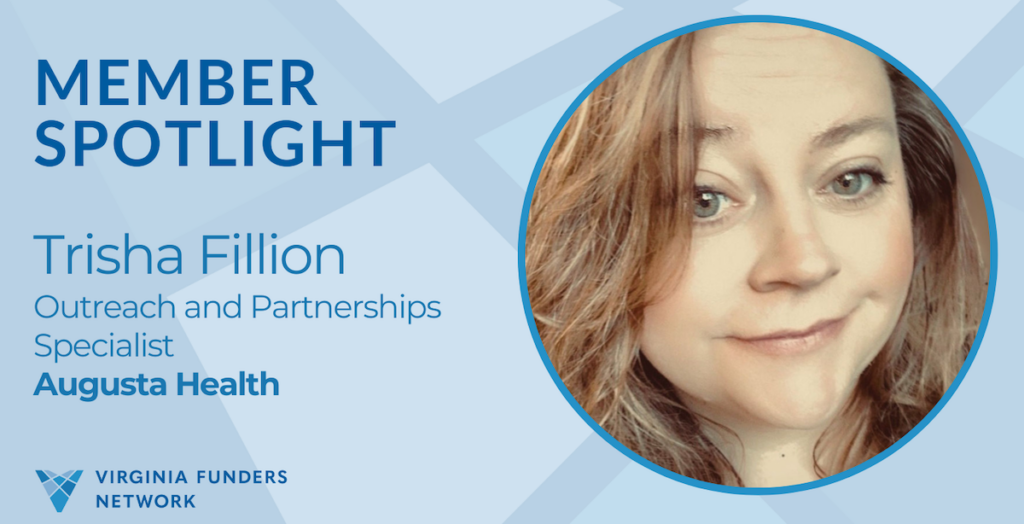
This month’s “Member Spotlight” features Patricia “Trisha” Fillion, Community Outreach and Partnerships Specialist at Augusta Health. Here’s a little bit more about Trisha and her work in philanthropy:
Describe your philanthropic philosophy and how your philosophy shapes your work.
While we are all capable of providing positive and impactful change as individuals and organizations, by supporting, uplifting, and partnering financially with other organizations working in that field, we can reach more people with a specialized approach.
How have changes over the past few years influenced your leadership and/or grantmaking?
In response to the compassion our neighbors showed towards each other during the pandemic, a sense of humanitarian care inspired me to start my own grassroots nonprofit organization with my husband, called The Neighbor Bridge. The Neighbor Bridge’s mission is to help provide food, clothing, and supplies to local families in need through projects that connect neighbors and the community.
Since it’s founding in 2019, and particularly strengthened during the pandemic, we have established six outdoor food pantries with 24/7 access for food, as well as opportunities for neighbors to contribute to their community by donating food. We have also established a Traveling Coat Closet, visiting local schools and organizations, working to ensure that no one in our community is without a coat during the winter months. In addition, we operate a brick-and-mortar client-choice food pantry and a clothing closet boutique. Our flagship project, Staunton Waynesboro Augusta Thanksgifting (SWAT) project, has been instrumental. It not only annually provides 100 local families with the ingredients for a full Thanksgiving meal to enjoy at home but also ensured new coats for all children and diapers for babies and toddlers. This experience has profoundly influenced my approach to leadership and grantmaking, emphasizing community support and responsiveness. Having a nonprofit has helped me with perspective in my role at Augusta Health as I work in this position as a grant funder, which has better equipped me to assist other organizations, help in enhancing their outcome reporting and fostering stronger partnerships with them.
What are Augusta Health’s top three areas of focus for 2024?
- Access to Healthcare
- Behavioral Health and Substance Use
- Nutrition and Physical Activity
What partnerships and/or collaborative efforts have been meaningful to you in the last year? What have those partnerships/collaborative efforts helped you accomplish?
Our organization has been involved in several meaningful partnerships and collaborative efforts this past year. One of the most significant collaborations was with the Community Foundation of the Central Blue Ridge, Valley Homeless Connection, and the Central Shenandoah Planning District Commission in late 2023. This partnership enabled us to successfully organize a housing summit in our local community. Working together, we were able to pool resources, expertise, and networks to address the pressing housing issues in our community. The summit brought together key stakeholders, including policymakers, community leaders, and housing experts, to discuss challenges and explore innovative solutions. As a result, we raised awareness about local housing needs, fostered new relationships, and laid the groundwork for future initiatives aimed at improving housing accessibility and affordability that continue on today. Moreover, this summit created an opportunity for a dedicated group to be formed, which will spearhead change in our area. The momentum from the initial summit has carried forward, helping us plan a follow-up summit this past June to continue our efforts and build on the progress made to date. This collaborative effort has been instrumental in advancing our mission and making a tangible impact in our community regarding housing insecurity.
*Augusta Health along with The Community Foundation for the Central Blue Ridge and The Alleghany Foundation will be hosting this year’s Shenandoah Valley Regional Funders Gathering on August 13. This year’s gathering will provide a “sneak peak” on the Central Shenandoah Planning District Commission housing study.
How has VFN been relevant to the work you’re doing?
The 2024 conference was the first VFN conference I have had the pleasure of attending, and it provided an excellent opportunity to connect with others in my field. I enjoyed meeting new colleagues and strengthening current connections. My favorite VFN moment was participating in the discussion around housing at our housing summit. Our area’s housing summit directly highlighted how housing is tied to health and the profound impact that a lack of housing has on health disparities. Richmond’s housing crisis, while sharing similarities, communities are still seeing systemic racism affecting communities and that where someone lives deeply influences their lifespan. This discussion was eye-opening and underscored the importance of addressing housing and community issues as a fundamental aspect of improving community health.
What else would you like your fellow funders to know?
Establishing clear guidelines and purposes for our funding ensures the greatest impact. For instance, our CHNA and Community Building initiatives now shape our funding decisions, guiding us towards initiatives that make a real difference in our community. Building meaningful partnerships with local organizations is essential. This involves more than just distributing money—it’s about understanding their programing and how it aligns with the community needs, and how we can help them make an impact.